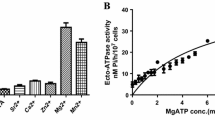Abstract
In the present work we characterized the ecto-ATP diphosphohydrolase activity of the trypanosomatid parasite Herpetomonas muscarum muscarum. This parasite hydrolyzed ATP at a rate of 15.52 nmol Pi/mg protein/min and this activity reached a maximum at pH 7.5. Classical inhibitors of acid phosphatases, such as sodium orthovanadate (NaVO3), sodium fluoride (NaF), and ammonium molybdate presented no effect on this activity. MgCl2, ZnCl2, and MnCl2 stimulated the ATP hydrolysis by H. m. muscarum. The ecto-ATPase activity was insensitive to oligomycin and sodium azide, two inhibitors of mitochondrial Mg-ATPase, bafilomycin A1, a V-ATPase inhibitor, ouabain, a Na++K+-ATPase inhibitor and to levamizole, an inhibitor of alkaline phosphatase. An extracellular impermeant inhibitor 4,4′-diisothiocyanostylbene 2′,2′-disulfonic acid (DIDS) and a inhibitor of some ecto-ATPases, suramin, which is also a competitive antagonist of P2-purinergic receptors, promoted a great inhibition on the ATP hydrolysis. This enzyme is able to hydrolysis ATP, ADP, UTP, and UDP, but not GTP, GDP, CTP, or CDP. ADP inhibited the enzymatic activity in a concentration dependent manner, reaching 70% inhibition.
Similar content being viewed by others
Author information
Authors and Affiliations
Additional information
Received: 17 September 2002 / Accepted: 19 November 2002
Rights and permissions
About this article
Cite this article
Alves-Ferreira, M., Dutra, P., Lopes, A. et al. Magnesium-Dependent Ecto-ATP Diphosphohydrolase Activity in Herpetomonas muscarum muscarum . Curr Microbiol 47, 0265–0271 (2003). https://doi.org/10.1007/s00284-002-3975-3
Issue Date:
DOI: https://doi.org/10.1007/s00284-002-3975-3




